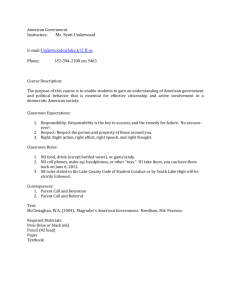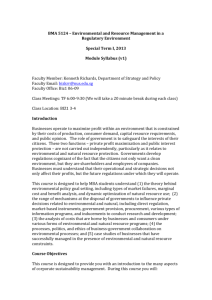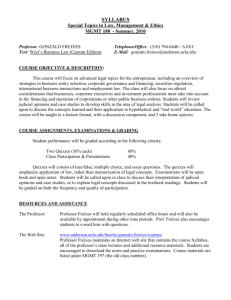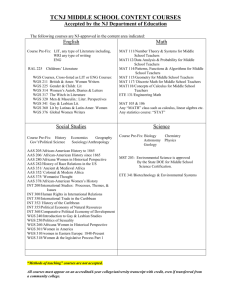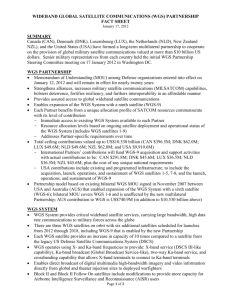PLS 105 Introduction to World Politics
advertisement
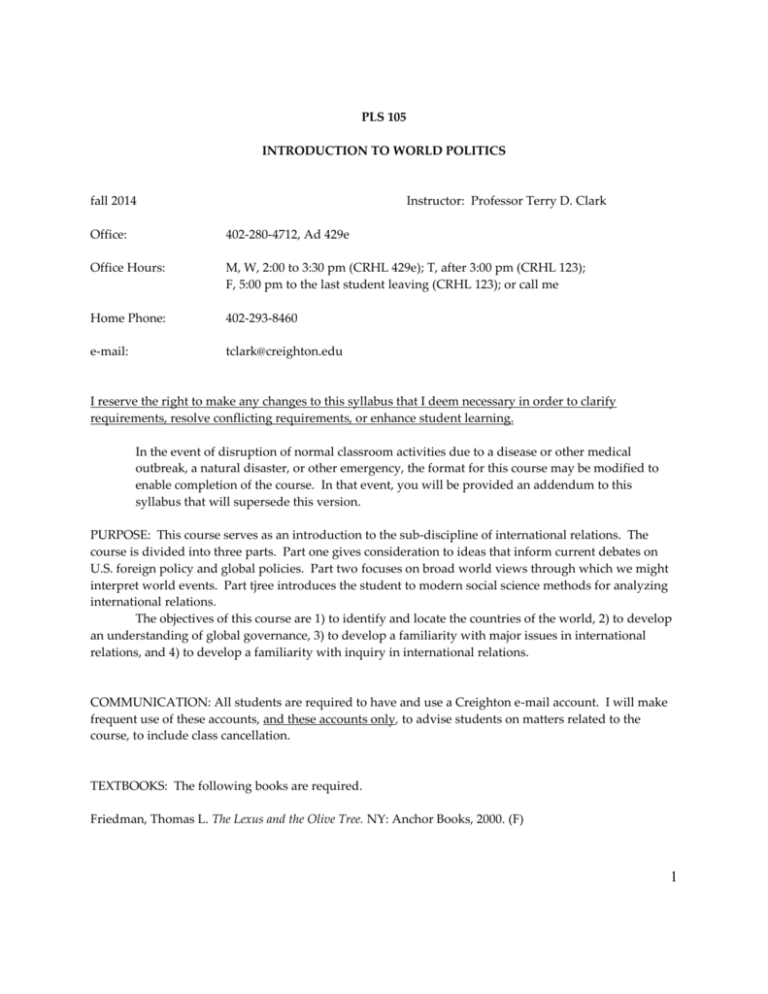
PLS 105 INTRODUCTION TO WORLD POLITICS fall 2014 Instructor: Professor Terry D. Clark Office: 402-280-4712, Ad 429e Office Hours: M, W, 2:00 to 3:30 pm (CRHL 429e); T, after 3:00 pm (CRHL 123); F, 5:00 pm to the last student leaving (CRHL 123); or call me Home Phone: 402-293-8460 e-mail: tclark@creighton.edu I reserve the right to make any changes to this syllabus that I deem necessary in order to clarify requirements, resolve conflicting requirements, or enhance student learning. In the event of disruption of normal classroom activities due to a disease or other medical outbreak, a natural disaster, or other emergency, the format for this course may be modified to enable completion of the course. In that event, you will be provided an addendum to this syllabus that will supersede this version. PURPOSE: This course serves as an introduction to the sub-discipline of international relations. The course is divided into three parts. Part one gives consideration to ideas that inform current debates on U.S. foreign policy and global policies. Part two focuses on broad world views through which we might interpret world events. Part tjree introduces the student to modern social science methods for analyzing international relations. The objectives of this course are 1) to identify and locate the countries of the world, 2) to develop an understanding of global governance, 3) to develop a familiarity with major issues in international relations, and 4) to develop a familiarity with inquiry in international relations. COMMUNICATION: All students are required to have and use a Creighton e-mail account. I will make frequent use of these accounts, and these accounts only, to advise students on matters related to the course, to include class cancellation. TEXTBOOKS: The following books are required. Friedman, Thomas L. The Lexus and the Olive Tree. NY: Anchor Books, 2000. (F) 1 Huntington, Samuel P. The Clash of Civilizations: Remaking of World Order. NY: Simon and Schuster, 1996. (H) Nye, Joseph S., Jr. The Paradox of American Power: Why the World’s Only Superpower Can’t Go It Alone. Oxford: Oxford University Press, 2002. (N) Shively, W. Phillips. The Craft of Political Research. 6th edition. Upper Saddle River, NJ: Prentice-Hall, 2005. (S) Williams, Phil, Donald M. Goldstein, and Jay M. Shafritz. Classic Readings and Contemporary Debates in International Relations. 3rd edition. Stamford, CT: Cengage Learning, 2006. (WGS) EVALUATION: You will be evaluated on the basis of three (3) examinations, participation in class discussions, and unannounced quizzes. The weight for each component is as follows: hourly examinations 25% each = 75% participation 10% unannounced quizzes 15% Points for each requirement will be assigned from 0 to 100. The final course grade will be determined on the basis of the weight for each assignment and the following scale. 93 to 100 88 to 92 83 to 87 78 to 82 70 to 77 60 to 69 below 60 A B+ B C+ C D F Class Attendance, Absences, and Participation: You will be assigned a grade based on your participation in class discussions which will be worth ten percent of your final grade. Obviously, if you attend class infrequently, you can not participate and your grade will suffer as a result. Unless you inform me in advance of the reason for an absence, you will be given an unexcused absence. Excused absences are only given for illness, family emergencies, or University sponsored events. Those with an excused absence on a quiz day are excused from taking the quiz (no make-up quiz is required). Those with an excused absence for an exam are responsible for coordinating a make-up exam. I retain the right to determine what constitutes an excused absence. You will be penalized one full point on your final grade for every unexcused absence over a limit of three. I do not offer make-ups for quizzes or exams missed owing to an unexcused absence. Should you miss a quiz or an exam as a result of an unexcused 2 absence or without having informed me of the reason for the absence in advance, you fail the quiz or exam. Readings for the course are listed in the assignment section of this syllabus. Please, read the assigned materials by the earliest date listed for each topic. In the expectation that you have done so, I will feel free to call upon students to respond to questions based on the readings. Even if I do not call on you, you should make sure that you read and comprehend the assignments since I do not intend to lecture "from the book." Instead, I will use the readings as a "springboard" for the day's lecture. Unannounced Quizzes: As a further incentive for you to read and participate in class, students will take unannounced quizzes during the semester. They will be worth 15% of the final grade. There will be no make-up quizzes. Unless you have an appropriate written excuse from a doctor or the Dean, you will receive a zero for each quiz missed. There will be two types of quizzes. The first type of quizzes is designed to test your understanding of the basic ideas and concepts introduced in the assigned readings. You will be quizzed on these ideas and concepts before they are discussed in class. The second type of quizzes will test your knowledge of the geographic location and names of the countries of the world. You should avail yourself of the multiple internet sources that identify the countries of the world and offer you an opportunity to engage in interactive self-testing. Late Submission Policy: I do not accept late submissions of take-home exams. Unless properly justified well in advance of the exam, I do not offer make-ups for in-class exams. Should you miss an exam without a proper reason, of which you inform me in advance, you fail the exam. ACADEMIC HONESTY: All work that you submit must be your own, and all sources must be properly cited. The purchase of "research service" papers, plagiarism, resubmission of prior work, obstructing the work of others, misuse or abuse of library or computer resources or any form of misrepresentation in gathering or presenting data constitute academic dishonesty. While I do not expect anyone to engage in such practices, should you do so, you will receive an "F" for the course. Suspected cases of academic dishonesty will be reported to the Dean's office and managed according to the College of Arts and Sciences academic honesty guidelines (http://puffin.creighton.edu/ccas/FacStaff/polManual/polManual.htm). Grounds for investigating papers for this will include, but will not be limited to my judgement that work is not responsive to the assignment, a discrepancy of more than one letter grade separating a paper from prior work submitted by the student, or my evaluation that the paper reflects knowledge and/or writing styles not usually available to undergraduate students. OFFICE HOURS: Let me encourage you to visit with me to discuss any problems you are having with the materials or course assignments. Do not wait until the last minute to seek advice or assistance. You may 3 well find that my calendar is full. My office hours are on the first page of this syllabus. You may also reach me by e-mail or you may call me (402-280-4712). You will find me available most evenings. ASSIGNMENTS: Readings are to be completed by the first day of the assignment as noted below. Topic Dates Assignment International Relations: A History 27 August none No Class 1 September Labor Day Globalization I 3- 8 September F, 3-144 Globalization II 10-15 September F, 145-326 No Class 17 September Mass of the Holy Spirit Clash of Civilizations I 22 September H, 19-81 Class of Civilizations II 24 September H, 81-182 Class of Civilizations III 29 September H, 183-322 Soft Power I 1 October N, 1-110 Soft Power II 6 October N, 111-172 First Exam 8 October 1 Global Governance 2. Issues in IR Level of Analysis 13 October WGS, 133-147 War 15 October WGS, 458-523 Fall Break - October 19 to October 26 Paradigms: Realism 27-29 October WGS, 40-73 Paradigms: Liberalism 3-5 November WGS, 5-40, 122-127 Structure 10 November WGS, 91-114 4 Deterrence 12 November WGS, 413-437 Cooperation 17 November WGS, 302-352 Non-State Actors 19 November WGS, 209-251, 632-660 Second Exam 24 November Thanksgiving Break - November 26 to 30 3. Designing Inquiry in IR Research in IR I 1 December S, chapters 1-2, 4-5, 11 Research in IR II 3 December S, chapters 6-7 Research in IR III 8 December S, chapter 8-9 Research in IR IV 10 December S, chapter 10 Third Examination- Friday, December 19, 8:00-10:40 A.M. 5



